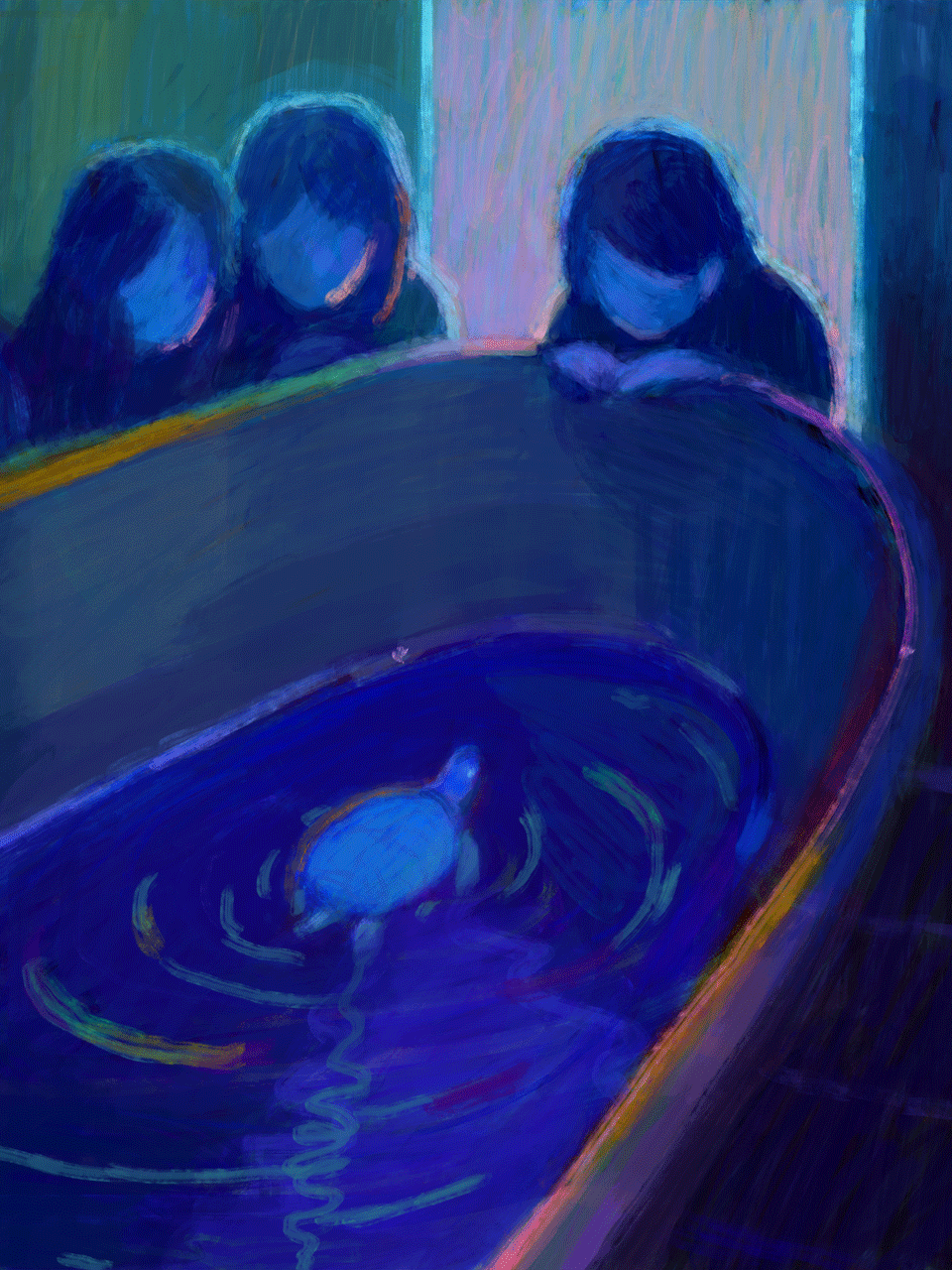Soft Sculpture

This is the fourth story in this summer’s online Flash Fiction series. You can read the entire series, and our Flash Fiction stories from previous years, here.
“My birthday party was in March,” Ilka told Bridget. The two old friends were walking on Riverside Drive at the turn of the season when you learn all over again that forty-nine degrees requires more than a jacket. “And I got what seemed an inspired present, a little . . . a . . . a . . . a what do you call the animal with the exoskeleton?” Ilka frowned, impatient and irritated at what was not, at that moment, available to her. “I always mean to figure how, routinely and with minimal fuss, to apologize for another word I can’t find in my head, cannot form in my mouth. Bridget, what’s the obvious—what is the first animal you think of that carries its roof so conveniently attached on its own back?”
“A tortoise,” said Bridget.
“A little tortoise,” Ilka said. “Eine kleine Schildkröte. I called it my Kröterl. That was the week of the Hitler takeover.”
Bridget had stopped and turned to her friend, who was saying, “No way am I going to remember which of the six or seven little girls brought what turned out to be an embarrassment. That thing sat and didn’t do anything. Just sat there. We shoved it, we pushed, we poked, we nudged. It withdrew its head under its roof and would not and would not move. My mother to the rescue. Mutti took all the children into the bathroom. You have to understand that this is a bathroom in Vienna and it’s the thirties. Mutti had to go find the matches and light the wall-mounted gas heater and warm two inches of water to cover the bottom of the tub, and she put in the Kröterl, which began immediately to march, and it marched round and round the bathtub at the speed of an Olympic footrace.
“The next day, the three Brown Shirts walked in and gave us twenty-four hours to be out of our apartment.” If Ilka frowned, it was to find herself, still and again rehearsing her ur-story.
When the ready tears that strangled Bridget’s throat allowed her to speak, she asked, “Where could you go?”
Ilka said, “They took me to Edith’s, a school friend. Mutti and Vati found beds with . . . people.”
Bridget was a writer with an indigestible Irish past of her own. Now she kept walking, alert to a fertile convergence in her understanding of the raw chill of a March day and the meaning of the word “apartment”: of having no choice but to leave a place where one was apart; of being without, that is outside walls of one’s own, and without a roof. Not to have a roof.
“And the tortoise?” Bridget asked Ilka. “Did you take it with you?”
Ilka thought, and she said, “I look back and I don’t see. . . . The Kröterl didn’t come to Edith’s with me.”
Bridget said, “But you remember walking out the door of your apartment? Did your mother take it? Did your father take the Kröterl?”
“What I remember,” Ilka said, “is the bathroom in our old apartment, mornings, my father sharpening his straight razor on the leather strop attached . . . was it to the doorknob? Sounds like Bluebeard—my poor Vati! And my recurring mishaps because I did not like to go into the bathroom after dark. My father’s terry-cloth robe, which hung on top of my mother’s robe behind the bathroom door, would put a ghostly sleeve on my shoulder.”
Bridget tended to invoke Henry James. She was trying to remember—what was it that James had said about a chatty old lady across the dinner table at one of those Victorian country weekends? The story of a dowager’s unwillingness to vacate the family home, the germ, if the old gossip would stop with the unusable detail—“the fatal futility of Fact,” James called it—that could be shaped into his next novel.
“Before Hitler,” Ilka was saying, “we used to summer in the mountains. I keep wanting to turn and ask my mother about the consignment of Enzian that followed us home—the blue, upturned bell of the gentian that grows as if without a stem from the ground. Who sent such a mass of these bluest blue flowers that the only place large enough was the bathtub?”
“Dead or alive,” worried Bridget. “The tortoise dead or alive must have gone somewhere.”
“When my kids were little,” Ilka said, “I got them a stuffed toy, a soft sculpture, a green Kröterl. The -erl ending is the Viennese diminutive; in German it would have been a Krötchen. It must still be somewhere around the apartment. It was a hand puppet. You could put your hand inside and make it draw its head back under its stuffed cotton roof.”
“Your e-mail,” Bridget said, “where I write you, is MyKroeterl38@usa.com.”
“That’s my address,” said Ilka. ♦
"soft" - Google News
July 28, 2022 at 05:01PM
https://ift.tt/gKj0pWu
“Soft Sculpture” - The New Yorker
"soft" - Google News
https://ift.tt/h1e43NE
https://ift.tt/0nJOIix
Bagikan Berita Ini














0 Response to "“Soft Sculpture” - The New Yorker"
Post a Comment